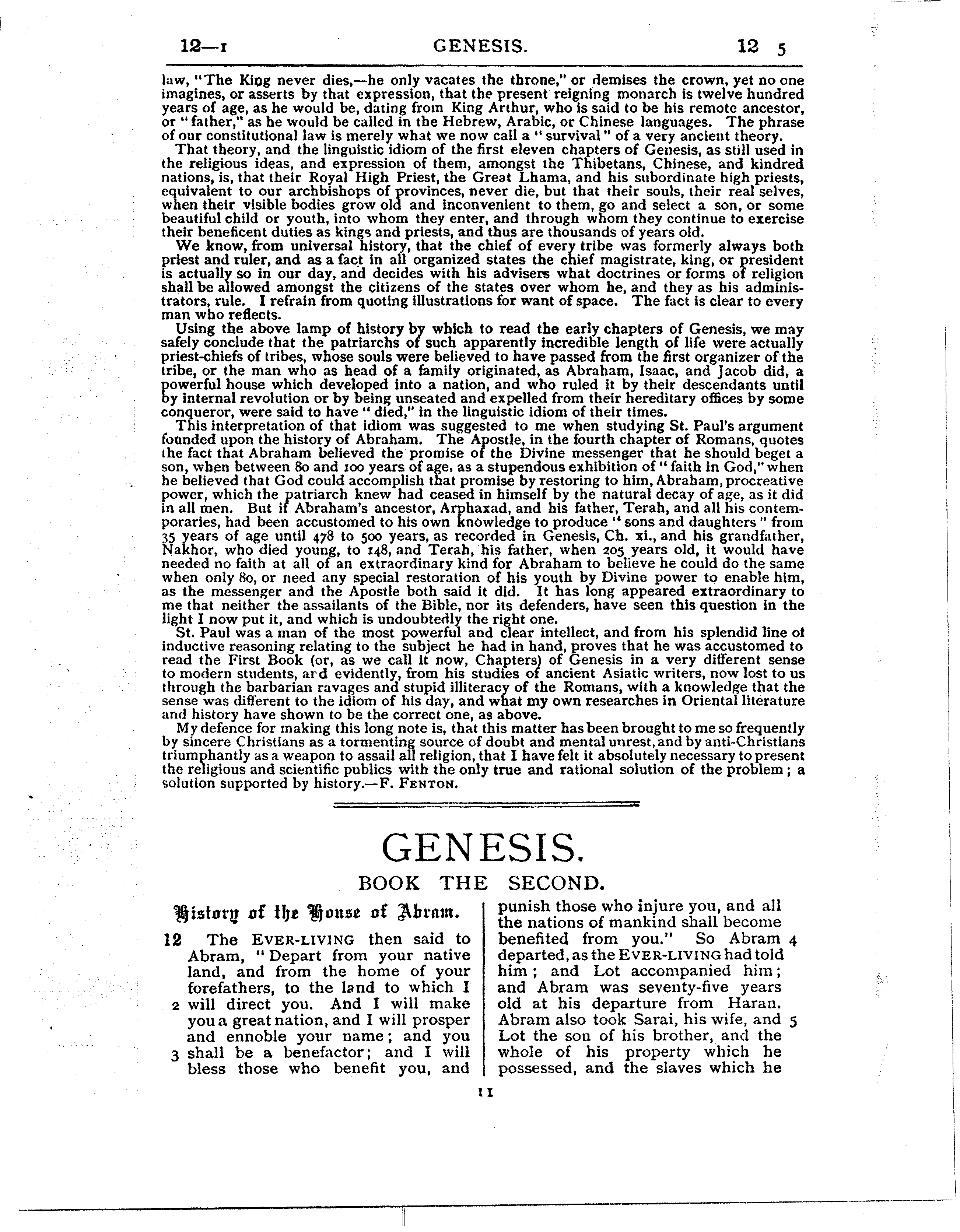Genesis - Ferrar Fenton Bible Translation page 11
The Five Books of Moses
the religious ideas, and expression of them, amongst the Thibetans, Chinese, and kindred nations, is, that their Royal High Priest, the Great Lhama, and his subordinate high priests, eciivalent to our archbishops of rovinces, never die, but that their souls, their real selves, g(pw en their visible bodies grow ol and inconvenient to them, go and select a son, or some beautiful child or youth, into whom they enter, and through whom they continue to exercise their beneiicent duties as kings and priests, and thus are thousands of years old. We knowk l historthat the chief of evertribe was formerlalwas both
, orn universay, ; y ypriest and ruler, and as a fact in all organized states the c ief magistrate, king, or resident pis actually so in our day, and decides with his advisers what doctrines or forms o religion shall be a lowed amongst the citizens of the states over whom he, and they as his adminis· trators, rule. l refrain from quoting illustrations for want of space. The fact is clear to every man who redects. Usinthe above lamof historbwhich to read the earlchaters of G g p y g y penesis, we may safely conclude that the patriarchs o such apparently incredible length of life were actually priest-chiefs of tribes, whose souls were believed to have passed from the first organizer ofthe tribe, or the man who as head of a family originated, as Abraham, Isaac, and jacob did, a ful house which develoed d who ruled it btheir descendants until
gowerpinto a nation, any y internal revolution or by being unseated and expelled from their hereditary omces by some in the linguistic idiom of their times. This interpretation of that idiom was suggested to me when studying St. Paul’s argument founded uon the historof Abraham. The Aostlein the fourth chater of R py p, pomans, quotes the fact that Abraham believed the promise 0 the Divine messenger that he should beget a when
, he believed that God could accomplish that promise by restoring to him, Abraham, procreative power, which the patriarch knew had ceased in himself by the natural decay of age, as it did {ll men. But i Abrah Arhaxadand his fatherTerahand all h from f ae until 8 ded in GenesisCh. xi.and his randfath 35 {ears og47to 5oo years, as recor, , ger, Na hor, who died young, to 148, and Terahghis father, when 205 years old, it would have needed no faith at all of an extraordinary kind for Abraham to believe he could do the same when only 80, or need any special restoration of his youth by Divine power to enable him, as the messenger and the Apostle both said it did. It has long appeared extraordinary to me that neither the assailants of the Bible, nor its defenders, have seen this question in the light- I now put it, and which is undoubtedly the right one. St. Paul was a man of the most powerful and clear intellect, and from his splendid line of
inductive reasoning relating to the subject he had in hand, proves that he was accustomed to read the First Book (or, as we call it now, Chapters? of Genesis in a very different sense to modern students, ard evidently, from his studies 0 ancient Asiatic writers, now lost to us h a knowlede that th hrouh the barb d stuid illiterac of the R tgarian ravages anpomans, witge sense was different to the idiom of his day, and what my own researches in Oriental literature and history have shown to be the correct one, as above. M y defence for making this long note is, that this matter has been brought to me so frequently
by sincere Christians as a tormenting source of doubt and mental unrest,and by anti-Christians triumphantly as a weapon to assail all religion, that I have felt it absolutely necessary to present zhg: re igicus and 5c§engiiic publics with the oniy true and rational sciution of the problem; a ‘?wOllJllOf1 SDIPPOHBCI hlS£OX'y.—··F. FENTON. BOOK THE SECOND. iljisiurg uf ibn ¥iuus¢ uf §\bmm.
12
The Evmz-1.1v1NG then said toDepart from your native land, and from the home of your forefathers, to the land to which I will direct you. And I will make youa great nation, and I will prosper and ennoble your name; and you shall be a benefactor; and I will bless those who benefit you, and punish those who injure you, and all the nations of mankind shall become S0 Abram departed, as the EvER·L1v1NG had told him; and Lot accompanied him; and Abram was seventy—five years old at his departure from Haran. Abram also took Sarai, his wife, and Lot the son of his brother, and the whole of his property which he possessed, and the slaves which he II
